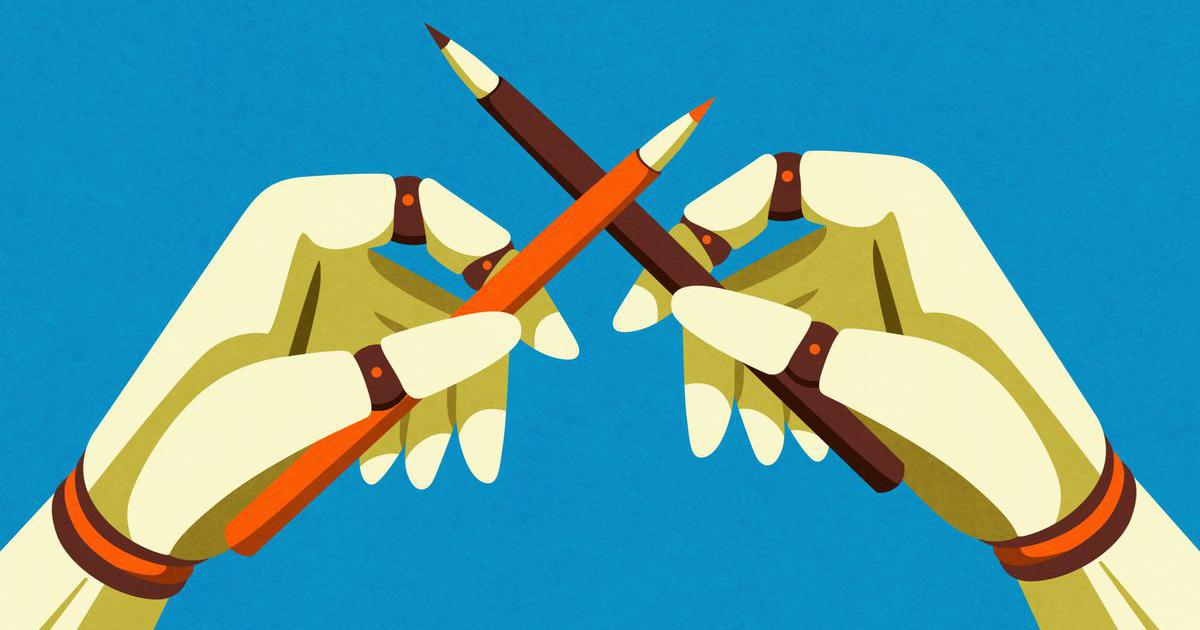This article was originally published in Rest of World, which covers technology’s impact outside the West.
One week before her thesis deadline, Xiaobing, a senior majoring in German literature, received a notice: Her university in northeast China would require the work of all fourth-year students to pass artificial intelligence content detectors. Any thesis flagged as more than 30% AI-generated would be rejected.
Xiaobing wasn’t worried – she had written the 16-page paper herself, only using ChatGPT and DeepSeek to polish a few paragraphs. But to be safe, she paid 70 yuan ($10) to run it through one of the testing platforms the school said it would use. She was shocked when it flagged half her paper as AI-generated.
“The whole process felt absurd to me. … [I feel like] an innocent person being dragged to the gallows,” Xiaobing told Rest of World.
Across China, tens of thousands of students like Xiaobing are navigating an academic crackdown that has ironically triggered a surge in the use of AI: Many students are turning to AI tools to outsmart the tests meant to detect AI-generated content.
More than a dozen universities – including the top-ranked Fuzhou University, Sichuan University, and Jiangsu University – recently limited AI-generated content in final papers to between 15% and 40%. Graduation theses are mandatory, and failing the checks can mean expulsion or graduation delays.
While universities argue the rules deter academic dishonesty, students say the platforms are glitchy and unreliable. Many students who used AI only sparingly or not at all report failing the tests. On social media, students have shared frustrations about “dumbing down” their writing to avoid suspicion, turning work they were proud of into awkward, childlike sentences. When manual edits don’t work, many resort to AI-powered tools designed to rewrite text and fool the detection systems.
Universities mostly rely on tools developed by China National Knowledge Infrastructure, (CNKI), Wanfang Data and Chongqing VIP – academic tech companies that have long sold tools for plagiarism detection. But some of the same platforms, including Chongqing VIP and PaperPass, also offer AI-reduction services to help students beat the checks, creating a profit loop.
Students from eight universities told Rest of World they’re confused by the “abrupt” policies and feel pressured to pay for AI services in order to graduate. Some turn to platforms advertising “purely human rewriting” by graduate students, costing hundreds of yuan (nearly $100). Others rely on cheaper AI chatbots to modify vocabulary and syntax. They say the results are mixed: Some services help them pass detection, while others introduce major errors.
Dede, a college student from Fujian province, paid about 500 yuan ($70) to a tutor who promised manual edits. While her AI score dropped, the content became incoherent. Key terms were misinterpreted, and phrases were swapped with inappropriate synonyms.
“It was so obvious she used an AI tool to edit my work instead of rewriting it herself,” Dede told Rest of World, pointing to one mistake: A reference to “three knives,” a traditional hair ornament worn by Fujian women, was changed to “three-bladed tools” – a nonsensical string of characters.
Another student said an AI-assisted service changed the word “semiconductor” in her paper to “0.5 conductor,” a senseless error that she found comical.
CNKI, the market leader in academic tech, has not publicly responded to complaints. Its website warns that its “test results might contain errors.” CNKI, Chongqing VIP, and Wanfang did not respond to Rest of World’s inquiries. Their websites all include similar disclaimers. None of the universities have responded to requests for comment.
Xiaobing tried everything to pass without AI help: reworking the essay’s arguments, rewriting sentences, swapping words. But her AI content score stayed above 50%. Eventually, she discovered a trick: replacing periods with commas. The sentences became rambling, but her score dropped by more than 20%.
“It feels like you get punished for writing too well,” she said. She graduated in mid-June with a thesis her school deemed 2% AI-generated.
The use of unreliable AI detection tools has sparked debate in the US and elsewhere. But China stands out for how quickly major universities have adopted them, despite a broader surge in AI enthusiasm.
Some professors worry the crackdown teaches students the wrong lessons. “The bigger issue is that these tools make students feel like using AI is something to be ashamed of,” said a communications professor from Shandong province, requesting anonymity to avoid professional repercussions. “It’s like how we’ve always avoided sex education. When something can’t be discussed honestly, it can’t be handled properly.”
Some universities are calling for a more moderate stance. In May, Nanjing University issued a notice acknowledging the limits of AI detectors and urging educators not to rely solely on the results.
Yanzi, a business major from Shandong, was initially afraid the AI detectors would steal her work. But after classmates complained about false positives, she tested her self-written thesis through CNKI. It flagged over 30% as AI-generated.
She tried rewriting it line by line, but still failed. With the deadline four days away, she gave in and spent 16 yuan ($2) on an AI startup tool that promised to modify text to pass AI detection.
“It was quite scary,” she told Rest of World, referring to the risk of not graduating.
Before the new policy, she had not heard that AI use in schoolwork was off limits. She said it was common for students to openly use AI.
“Some teachers even encouraged us to use AI for research,” she said.
Peiyue Wu is a freelance journalist based in New York City.
This article was originally published in Rest of World, which covers technology’s impact outside the West.










